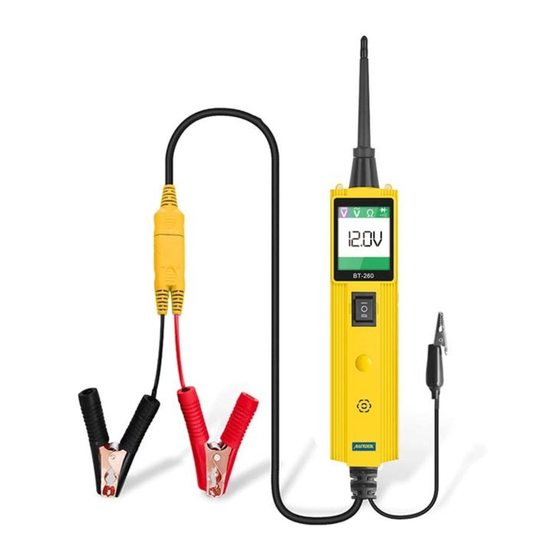Autool BT 260 Podręcznik użytkownika - Strona 6
Przeglądaj online lub pobierz pdf Podręcznik użytkownika dla Sprzęt testowy Autool BT 260. Autool BT 260 7 stron. Electric system tester

Activating Components w/Ground
While the tool in DC Voltage mode, contact the
probe tip to the negative terminal of the
component, the red LED should light. While
observing the red LED, quickly depress and
release the power switch rearward. If the red
LED went out and the green LED came on,
you may proceed with further activation. If the
green LED went off at that instant or if the
circuit breaker tripped, the tool has been
overloaded. This could happen for the
following reasons:
•
The contact you are probing is a direct
positive voltage.
•
The component you are testing is short-circuited.
•
The component is a very high current
component(i.e., starter motor).
If the circuit breaker is tripped, reset it by waiting for it to cool down (15 sec.) and then
depressing the reset button.
WARNING : With this function, if you are contacting a protected circuit, a vehicle's fuse
can be blown or tripped if you apply ground to it.
Checking for Bad Ground Contacts
Probe the suspected ground wire or contact with the probe tip.
Observe the green LED. Depress the power switch forward then release. If the green LED
went out and the red LED came on, this is not a true ground..
If the circuit breaker tripped, this circuit is more than likely a good ground. Keep in mind that
high current components such as starter motors will also trip the circuit breaker.
Following & Locating Short Circuits
Inmost cases a short circuit will appear by a fuse or a fusible link blowing or an electrical
protection device tripping (i.e., a circuit breaker). This is the best place to begin the search.
•
Remove the blown fuse from the fuse box.
•
Use the probe tip to activate and energize each of the fuse contacts. The contact which
trips the circuit breaker is the shorted circuit. Take note of this wire ' s identification code
or color.
•
Follow the wire as far as you can along the wiring harness.
9
Here is an example for this application.
•
If you are following a short in the brake light circuit, you may know that the wire must pass
through the wiring harness at the door sill. Locate the color-coded wire in the harness and
expose it.
•
Probe through the insulation with the probe tip, and depress the power switch forward to
activate and energize the wire.
•
If the circuit breaker tripped, you have verified the shorted wire. Cut the wire and energize
each end with the probe tip. The wire end which trips the circuit breaker again is the
shorted circuit and it will lead you to the shorted area.
•
Follow the wire in the shorted direction and repeat this process until the short is located.
Red/Green Polarity LED
The Red/Green Polarity LED lights up when the probe tip voltage matches the battery
voltage within ± 0.8 volts. It is added information that could be valuable to the Technician.
If the circuit you are testing is not within a 0.8 volt (plus or minus) of supply voltage, you will
see the voltage reading on the LCD but you will not hear a tone or see a red or green LED.
This tells you either you have a voltage drop in excess of 0.8 volt from battery voltage or you
are probing a circuit that has an increase of a 0.8 volt or more over battery voltage.
To determine battery voltage, simply remove the tip from the circuit and press the power
switch forward. Battery voltage will then be displayed on the LCD. The difference between
the battery voltage and what is read on the circuit is either voltage drop or voltage increase.
This allows you to determine a voltage drop without running back to check the battery. It ' s
just another one of time saving feature the tool has.
Test Tool Specifications
DC voltage range : 0-65V +1 digit
Resistance range : 0 – 200 KΩ
Frequency response of tone pass through
0Hz to 10Khz.
Circuit Breaker
Rating current: 1 – 10 Amp
Testing Standard
100% current : no trip
150% current: trip in one hour
200% current: trip in 3-30 seconds.
300% current: trip in 0.5-4.0 seconds
10
